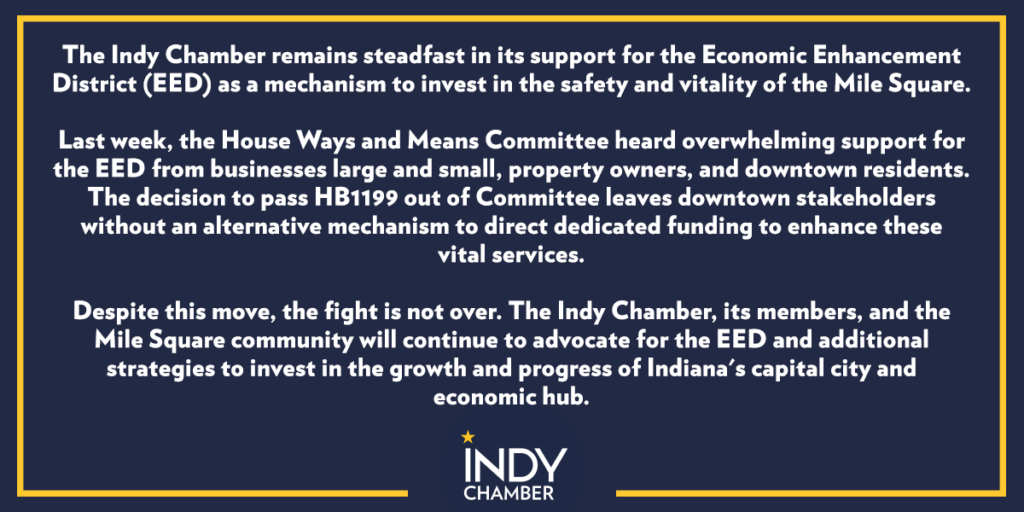It’s a Marathon AND a Sprint:Track and Field Edition

Confucious is credited with having said, “It does not matter how slowly you go as long as you do not stop.” These may be great words to live by, but they won’t help you get through an Indiana General Assembly “short session,” which we’ve begun thinking of as a marathon that lawmakers and stakeholders run at a sprint. Lace up those sneakers! It’s time for this week’s Indy Chamber Legislative Update: Track and Field Edition.
“If it’s not hard, you’re not dreaming big enough.”—Shalane Flannigan
On November 5, 2017, American Olympic long-distance runner Shalane Flanagan became the first American woman to win the New York City Marathon since 1977. It's safe to say, Flanagan knows a thing or two about working hard to achieve big goals.
Despite this week’s decision by the House Ways and Means Committee to pass legislation blocking the Mile Square Economic Enhancement District (EED) out of committee, we take heart from Flannigan’s example—and we hope you will, too. The legislative process for this bill is far from over, and the voices of the many Indy Chamber members and others who’ve spoken up in opposition to the EED repeal are making a difference. As the debate moves to the full House, it’s more important than ever to make yourself heard.
Below is our statement on the House committee’s vote. If you haven’t yet, visit www.careformilesquare.com to learn more about this vital issue and add your name to our letter to members of the General Assembly. Reach out to your state legislators directly (find them here) to let them know you “care for Mile Square.”

“If you want to become the best runner you can be, start now. Don’t spend the rest of your life wondering if you can do it.”—Priscilla Welch
Retired British marathoner Priscilla Welch wasn’t offering mere platitudes with this piece of advice. Welch’s career as a runner was perhaps the most improbable in all of modern athletics, given that she was a pack-a-day smoker until she began running competitively at age 35. And although her guidance was intended for other runners, we think it could resonate equally with Indiana entrepreneurs.
To help Hoosier entrepreneurs “start now,” Representative Jake Teshka introduced HB 1165, which seeks to establish a right-to-start act to support the development of new businesses in Indiana. Teshka’s bill, which passed out of the House Committee on Government and Regulatory Reform this week, would fill a crucial gap in our state’s economic development policy. Although Indiana is widely seen as a business-friendly state, we have yet to fully harness the power of new business creation as a driver of innovation and economic growth. 74% of net new job creation is driven by businesses younger than five years. Indiana is currently ranked 44th among US states for business starts. The Indy Region has made significant gains in this area (increasing the number of jobs at young firms by roughly 17% over the last decade), but we still lag behind our strongest peers in support creation and sustainability of new firms—a key indicator of an economy’s overall dynamism.
Peer cities like Nashville, Tennessee (which, it’s worth noting, has had its own EED since 1999) are often praised for the strength of their ‘Music City’ branding, as they should be. However, that stellar branding effort was built upon an already mature entrepreneurial strategy that delivered on the concept that an idea and grit could be leveraged into a thriving business—in music or otherwise. While Indy’s young firm jobs grew strongly from 2011 to 2021, Nashville has exploded with a 46% increase. Efforts like Rep. Teshka’s to leverage the buying power of the state to support new business starts are essential to increase Indiana’s dynamism and job creation.
“Running: cheaper than therapy.”—unknown
It seems no one’s quite sure who first offered this very succinct cost-benefit analysis, but one thing we can all be sure of is mental health services can be expensive. Even heftier, though, are the human costs that can arise when a patient isn’t paired with the right provider.
To help address these human and economic costs, Senator Baldwin—accompanied by his colleagues Senators Crider and Charbonneau— introduced SB 10, which passed unanimously out of the Senate Committee on Health and Provider Services earlier this week. If enacted, SB 10 will establish a grant pilot program to help Indiana municipalities with the costs of starting or expanding mobile-integrated healthcare programs and mobile crisis teams. Credit for the concept behind SB 10—and for building the coalition backing it—goes to a friend of the Chamber and close partner, Noblesville Mayor Chris Jensen.
Senator Baldwin has championed this important piece of legislation as a way to reduce public safety expenses by decreasing the number of non-emergency calls that have historically been routed to law enforcement and other first responders. Under his bill, those calls would instead prompt the deployment of teams that include medical or behavioral health providers better equipped to address situations where the underlying issue is health-related. Local communities could receive state grant funds for mobile integrated healthcare or crisis teams that address a variety of needs, including mental health or addiction issues, homelessness, or access to maternity care.
The Indy Chamber firmly supports proposals like SB 10 to address Hoosiers’ behavioral health needs. The Kaiser Family Foundation reports that Indiana’s rates of death from suicide, opioid overdose, and substance misuse disorder are all higher than the national averages, and it’s estimated that 60-68% of adult Hoosiers suffering from mental illness don’t currently receive treatment.
The cost to Hoosier families is immeasurable, but the Indiana Behavioral Health Commission says the cost to our state’s economy is as much as $4.2 billion each year. That staggering sum includes $885 million in annual productivity losses and $556 million worth of caregiving provided by family members—often at the expense of their employment. Addressing these human and economic costs is critically important to the state’s business community and we see SB 10 as a creative tool used to invest in a comprehensive approach to Hoosiers’ mental health, now and into the future.
“You don’t have to be great to start, but you have to start to be great.”—Zig Ziglar
There’s no evidence that the late American author, salesman, and motivational speaker Zig Ziglar ever ran an organized race. He was, however, the tenth of his parents’ twelve children, so we think it’s fair to assume he did a fair bit of running around on their Mississippi farm.
No doubt Senators Rogers, Holdman, and Charbonneau had great starts for our state’s children in mind when they drafted SB 147, a bill that looks to provide property tax relief to independent childcare centers and businesses with on-site facilities. The bill was heard in the Senate Committee on Tax and Fiscal Policy and a vote is expected next week.
Indiana law already provides some property tax exemptions to the state’s relatively few for-profit childcare providers if they provide services for children between four and six years old. Rogers hopes expanding the tax exemptions and streamlining some other regulatory requirements will prompt more providers to offer services in Indiana’s numerous childcare deserts and has said she doesn’t believe the bill will have “a huge fiscal impact,” assuming it helps parents of infants and toddlers enter or remain in the workforce.
Indiana’s childcare needs are acute and directly connected to the state’s ability to attract top talent and new business investment. We hope to see Rogers’ bill go the distance, as a marathoner would say. We’re hopeful, too, that including employer-based childcare programs in the bill motivates many of our region’s employers to consider offering on-site childcare to hardworking Hoosier parents. We’ll be tracking this bill, along with several other measures aimed at expanding childcare options and access, as the 2024 session picks up speed.
Member Stories

DB Services Supports Ukraine Crisis Relief Through Surveys for Success Program

Join Our Newsletter
Quick Connect Links


